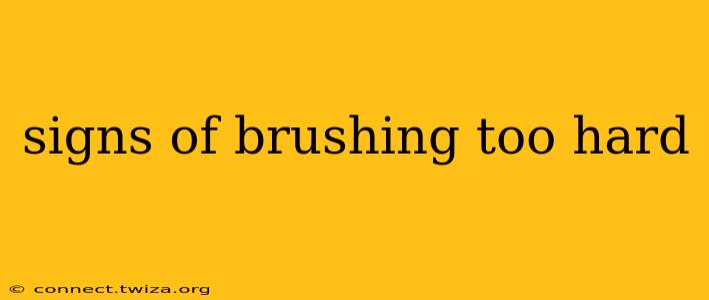Brushing your teeth is crucial for maintaining good oral hygiene, but using excessive force can lead to several problems. Many people unknowingly brush too hard, causing damage to their gums and teeth over time. Understanding the signs of brushing too hard is the first step towards protecting your oral health. This comprehensive guide will explore the common indicators, the consequences of aggressive brushing, and how to adopt a gentler technique.
What are the Signs of Brushing Too Hard?
The most noticeable signs often appear in your gums and teeth. Here are some key indicators:
-
Bleeding Gums: This is one of the most common and readily apparent signs. If your gums bleed frequently during or after brushing, it's a strong indication that you're brushing too hard. While occasional bleeding can happen, persistent bleeding is a cause for concern.
-
Receding Gums: Over time, aggressive brushing can wear away the gum tissue, leading to gum recession. This exposes the roots of your teeth, making them more sensitive and susceptible to decay. You might notice your teeth appearing longer than they used to.
-
Sensitive Teeth: If your teeth are unusually sensitive to hot, cold, or sweet foods and drinks, it could be due to enamel erosion caused by forceful brushing. The enamel is the protective outer layer of your teeth, and aggressive brushing can wear it away, exposing the dentin underneath which is much more sensitive.
-
Wear and Tear on Tooth Enamel: While less visible to the naked eye, excessive brushing can wear down your tooth enamel over time. This can lead to increased tooth sensitivity, discoloration, and an increased risk of cavities. A dentist can often spot this during a routine check-up.
-
Gingival Recession: This is a more advanced sign and refers to the permanent pulling back of the gum line, exposing more of the tooth root. This can lead to significant dental problems if left untreated.
What Happens If I Brush Too Hard?
Brushing too hard has serious consequences for your oral health. The damage isn't just cosmetic; it can lead to significant long-term problems:
-
Gum Disease (Gingivitis and Periodontitis): Aggressive brushing can irritate and damage the gums, making them more susceptible to infection. This can lead to gingivitis (inflammation of the gums) and eventually periodontitis (a more severe form of gum disease that can lead to tooth loss).
-
Tooth Sensitivity: As mentioned earlier, enamel erosion exposes the dentin, leading to increased sensitivity to temperature changes and certain foods.
-
Tooth Decay: Receding gums and enamel erosion expose the tooth roots, making them vulnerable to cavities.
-
Increased Risk of Tooth Loss: In severe cases, gum disease and enamel erosion can lead to tooth loss.
How Can I Tell If I'm Brushing Too Hard?
It's easy to fall into the habit of brushing too forcefully. One way to check your technique is to place a finger on your toothbrush head as you brush. If you feel too much pressure on your finger, you're likely brushing too hard.
How Hard Should I Brush My Teeth?
The goal is to clean your teeth effectively without damaging your gums or enamel. You should use a soft-bristled toothbrush and gentle, circular motions. Think of it as more of a massage than a scrub. Your toothbrush should be making contact with your teeth but not aggressively scraping at them.
What Type of Toothbrush Should I Use?
Opt for a soft-bristled toothbrush. These are less likely to damage your gums and enamel compared to medium or hard-bristled brushes. Consider electric toothbrushes with a soft head, as they often have built-in sensors to help regulate pressure.
How Often Should I Replace My Toothbrush?
Replace your toothbrush every 3-4 months, or sooner if the bristles are frayed. Frayed bristles are less effective at cleaning and can be more abrasive to your teeth and gums.
What Should I Do If I'm Already Experiencing These Symptoms?
If you're already experiencing signs of brushing too hard (bleeding gums, sensitive teeth, receding gums), don't panic. Immediately switch to a softer toothbrush and a gentler brushing technique. Schedule an appointment with your dentist for a checkup. They can assess the damage and recommend appropriate treatment. Early intervention is key to preventing more serious problems.
Remember, healthy gums and teeth are essential for overall health and well-being. By adopting a gentler brushing technique, you can significantly reduce your risk of developing oral health problems.
